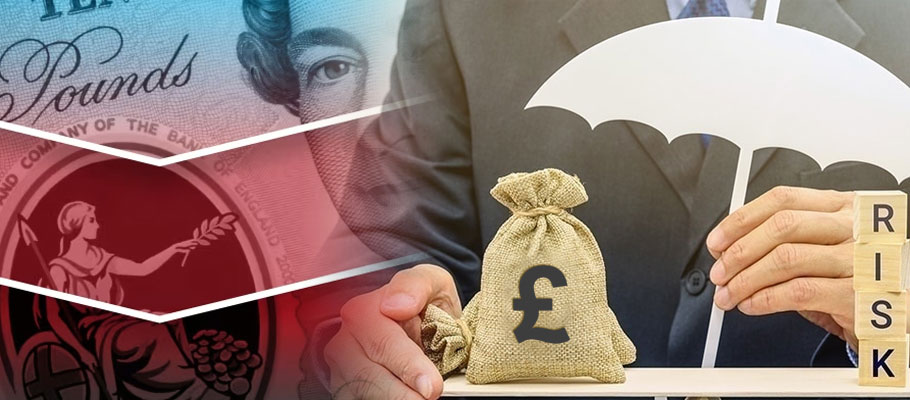
Published: July 31st, 2024
Bullish bets on the Pound have climbed to record highs over the past fortnight, with GBP/USD reaching a new one-year high north of USD 1.30. Analysts at HSBC now say a correction may be on the horizon as speculative positioning for GBP looks ‘overcrowded’ ahead of this week’s Bank of England’s (BoE) rate decision on Thursday.
In an analysis of data from the UK’s Commodity Futures Trading Commission, the bank’s FX strategy unit said large institutional traders like asset management firms, hedge funds, and banks all extended their net long positions on Sterling last week.
Those positions are a product of the upbeat sentiment driven by Britain’s rosy economic performance for the year to date, which has exceeded consensus expectations. Add to that the relative political stability of a new national government with a large majority in parliament, and the Bank of England’s policy of delaying interest rate cuts, which has elevated GBP’s appeal amongst carry traders.
HSBC says it is watching carry trades in particular, which have delivered gains based on Sterling’s high yields relative to other currencies. There is a risk that these could unwind over the coming weeks, a period which will likely be marked by ambiguous monetary policy in America as US presidential election campaigning starts to hit fever pitch.
Carry trades for GBP have grown after a period of low forex volatility, but if notable price swings return and large investors perceive greater macro risk, currencies like Sterling with high yields and high sensitivity to risk sentiment could be impacted.
Traders of all sizes will be watching this week's Bank of England meeting closely, and HSBC says money markets are assuming the probability of a quarter-point interest rate cut in August to be around 40 per cent.
In mid-June, HSBC said the surprise summer election called by UK Prime Minister Rishi Sunak would have minimal short-term impact on the Pound, and the bank’s forex analysts also believed that the result would have little significant impact on GBP’s long-term trajectory.
'Our view is that the Pound will be mainly influenced by rates in the second half of the year and remain on a path of slow but steady weakness over the coming months’.
HSBC and others noted that that consistent polling gave the center-left Labour party the likely win by a wide margin, and traders had begun factoring in the likely policy and economic outcomes of that result. Some believed a Labour government would be reflexively pro-EU, but there were (and are) questions about the impact that stance will have on GBP.
If the new government seeks closer alignment with Brussels on issues like common defense coordination or simplified travel rules, these would be seen as peripheral measures. If Westminster sought to rejoin the customer union, that would be a game changer. However, Labour has firmly ruled out anything that would be seen as a ‘betrayal’ of Brexit.
HSBC believed BoE interest rate policy would be more definitive for the Pound, but even on that measure, it would require the start of a new easing cycle before the bank's analysts would start reassessing GBP’s prospects reassessment of the currency."
That stance was challenged by a Reuters analysis which pointed to Sterling hitting its highest level against EUR since 2016. Currency analysts wrote that a return to post-Brexit highs could happen if the British and French elections delivered the right set of combined outcomes.
‘EUR/GBP could drop to 0.80 for the first time in eight years if Macron's liberal alliance loses a significant number of seats in the French parliamentary election at the same time the UK's pro-business Labour Party wins its expected majority next week’.
In June 2023 the Euro underwhelmed against all its G10 peers except for the Dollar in the last week of the month. EUR only rose in relation to the Brazilian Real, Turkish Lira and Chinese Renminbi on the broader G20 table, however some analysts believed it would remain a laggard for the near term.
EUR started experiencing losses when European Central Bank (ECB) President Christine Lagarde said interest rates would likely be raised again soon, at least until Frankfurt policymakers believed that their monetary decisions had become restrictive enough to send inflation back down to the central bank’s two per cent target.
The Euro experienced further declines when German state statistics agency Destatis announced that the country’s manufacturing orders fell more than 10 per cent in May, the biggest one-month decline since the onset of the pandemic. The print followed a Eurostat print which indicated that European retail sales dropped a full percentage point in the same month.
An analyst note from Nomura in London said that the broad EUR rally underway in early June was ‘done. EURUSD looked ready ‘to stick below 1.1100 and most EUR crosses have recently spun lower.’
Nomura added that investors were realizing the risk and may now be pricing-in a negative direction of travel, particularly as the ECB had unleashed its most hawkish monetary tightening on record. Traders were watching to see what the impact would be on the Eurozone’s real economy.
That made Europe's economic data calendar particularly important. A cascade of negative signals from the EU’s biggest economies could have triggered forex traders to reprice their outlook for ECB interest rates.
It's not the first time that EUR had been on the back foot against G10 peers in 2023. Forex analysts at MUFG said in February of last year that the Greenback’s ongoing comeback wasn’t being held back by risk-off sentiment, or by trader concerns about signals from the US Fed’s open markets committee.
As investors shrugged off underwhelming PCE deflator data published the same week, MUFG said markets might be witnessing the return of Dollar dominance.